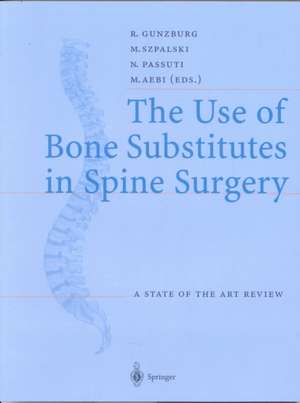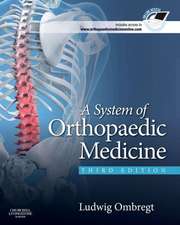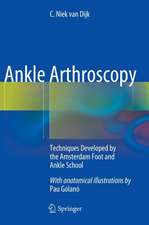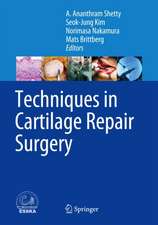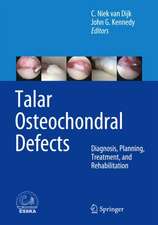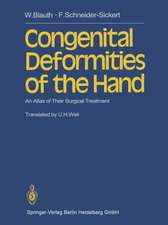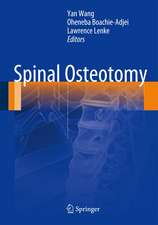The Use of Bone Substitutes in Spine Surgery: A State of the Art Review
Editat de R. Gunzburg, M. Szpalski, N. Passuti, M. Aebien Limba Engleză Paperback – 22 noi 2001
Preț: 711.88 lei
Preț vechi: 749.34 lei
-5% Nou
Puncte Express: 1068
Preț estimativ în valută:
136.21€ • 142.60$ • 112.71£
136.21€ • 142.60$ • 112.71£
Carte tipărită la comandă
Livrare economică 05-19 aprilie
Preluare comenzi: 021 569.72.76
Specificații
ISBN-13: 9783540426875
ISBN-10: 3540426876
Pagini: 136
Ilustrații: VI, 130 p. 56 illus., 11 illus. in color.
Dimensiuni: 210 x 279 x 7 mm
Greutate: 0.32 kg
Ediția:2002
Editura: Springer Berlin, Heidelberg
Colecția Springer
Locul publicării:Berlin, Heidelberg, Germany
ISBN-10: 3540426876
Pagini: 136
Ilustrații: VI, 130 p. 56 illus., 11 illus. in color.
Dimensiuni: 210 x 279 x 7 mm
Greutate: 0.32 kg
Ediția:2002
Editura: Springer Berlin, Heidelberg
Colecția Springer
Locul publicării:Berlin, Heidelberg, Germany
Public țintă
ResearchDescriere
Spinal arthrodesis is a generally accepted procedure for the management of patients with a variety of spinal disor ders. The primary goal for spinal fusion is to eliminate the instability of the spine, often caused by trauma, deformity, tumor, inflammation or infection, and common degenera tive deterioration of the motion segments. In many clini FRA paw', cal situations, the optimal solution in restoring the spine's integrity is through surgical intervention. There are many techniques of spinal fusion applicable to the lumbar spine. Posterior (PLIF) and anterior lumbar interbody fusion (ALIF) have been developed and employed to address PLlI' po . . . . . these concerns alone or in combination with various inter nal fixation devices. The anterior column is often recon structed with metallic intervertebral cages or biological Fig. ! Femoral ring allograft (FRA) and posterior lumbar inter implants (allograft or autograft bone) [16, 31]. body fusion (PLlF) spacers The success of every spine fusion procedure depends on the phenomenon of bone healing. Whether the healing process occurs depends on many factors, including the type This paper aims to provide a review of the two newly of biological graft, host factors, technique, and the rigidity developed biological cages, the femoral ring allograft of the particular surgical construct. Bone grafts serve two (FRA) spacer and the posterior lumbar interbody fusion main functions: they provide for the synthesis of new bone (PLIF) spacer (Fig. 1).
Cuprins
Biomaterials: the new frontiers in spine surgery.- General Principles.- Biology of bone and how it orchestrates the form and function of the skeleton.- With 5 Figures.- Osteoinduction, osteoconduction and osseointegration.- With 6 Figures.- Factors stimulating bone formation.- With 1 Table.- Influence of bone environment on ceramic osteointegration in spinal fusion: comparison of bone-poor and bone-rich sites.- With 2 Figures.- Physical and chemical aspects of calcium phosphates used in spinal surgery.- With 2 Figures and 2 Tables.- Experimental Models.- Demineralized bone matrix, bone morphogenetic proteins, and animal models of spine fusion: an overview.- Porous tricalcium phosphate and transforming growth factor used for anterior spine surgery.- With 6 Figures and 1 Table.- Potential of an ultraporous ß-tricalcium phosphate synthetic cancellous bone void filler and bone marrow aspirate composite graft.- With 6 Figures and 1 Table.- Comparison of a new bisphenol-a-glycidyl dimethacrylate-based cortical bone void filler with polymethyl methacrylate.- With 4 Figures.- Clinical Applications.- Vertrebral reconstruction with cortical allograft: long-term evaluation.- With 3 Figures and 2 Tables.- Outcomes of allogenic cages in anterior and posterior lumbar interbody fusion.- With 10 Figures and 2 Tables.- Clinical applications of bone graft substitutes in spine surgery: consideration of mineralized and demineralized preparations and growth factor supplementation.- With 2 Figures.- ß-tricalcium phosphate as a bone substitute for dorsal spinal fusion in adolescent idiopathic scoliosis: preliminary results of a prospective clinical study.- With 7 Figures and 4 Tables.- The use of sintered bone in spinal surgery.- With 2 Figures.- Plaster of Paris as bone substitute in spinal surgery.- With 4 Figures and 2 Tables.- Use of hydroxyapatite in spine surgery.- Bone substitutes in vertebroplasty.- With 2 Figures and 3 Tables.
